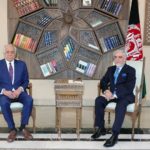Almost a year has passed. Unfortunately, no breakthrough has been made in the process of peace and reconciliation in Afghanistan. It is difficult to give a comprehensive and accurate answer to it now. But there is no doubt that the United States has a great influence on the Afghan peace process and regional peace cooperation. It is a pity that in promoting the peace process in Afghanistan, the United States is capricious and just gives lip services. Everything is based on its own interests first. This will not bring true peace to Afghanistan, but only create more troubles for internal reconciliation and regional cooperation in Afghanistan.
After ten rounds of tortuous negotiations, on February 29, 2020, U.S. Zalmai Khalilzad, special envoy for Afghanistan reconciliation and Mullah Abdul Ghani Baradar, deputy political leader of the Taliban and director of Qatar office, jointly signed a peace agreement in Doha, capital of Qatar. The agreement has set conditions for the complete withdrawal of international forces from Afghanistan and opened the process of internal peace talks in Afghanistan. Other key elements of the agreement include the exchange of prisoners, the Taliban’s commitment to keep a distance from international terrorist organizations and the withdrawal of U.S. and international forces within 14 months.
However, with the new president of the United States taking office, the US government has indicated that it will re-examine the above-mentioned peace agreement. So will the United States withdraw from Afghanistan according to the timetable set out in the agreement? Can the above agreement continue to be recognized by both parties? Can the inter-Afghan peace talks go smoothly? Can the peace and reconciliation process in Afghanistan be carried out as soon as possible? There are too many variables. In fact, what is more dangerous is that the United States has only put forward a withdrawal plan, but not a clear plan for resolving the conflict and for reconciliation in Afghanistan after their withdrawal. The United States is good at overthrowing a regime it does not like, mostly in the Middle East and Asia, through its military advantages, creating a mess and then dashing away.
At the regional level, as the United States reduces its presence in Afghanistan, neighboring countries including China, will play an increasingly important role in Afghanistan. Since 2012, various regional and extraterritorial actors have participated in and promoted dialogues and negotiations related to the Afghan peace process. However, according to the United States’ Asia-Pacific strategy, it began to worry that China, Russia, Iran and other regional countries would weaken its influence in Afghanistan and the Asia-Pacific region. Naturally, it would make troubles for these countries, especially China, at least weaken the friendly feelings of the Afghan people towards China through spreading fake news or even obstruct the friendly cooperation between China and Afghanistan and other relevant countries.
China’s position on the issue of Afghanistan is consistent and clear. China unswervingly supports the “Afghan led, Afghan owned” process of peace and reconciliation in Afghanistan, tries its best to provide help to Afghanistan, supports Afghanistan to improve and strengthen relations with relevant countries and gives full play to its advantages of Eurasian Continental Bridge to bring real development dividends to its people. Thus we should polish our eyes and stop being fooled by some country. The United States is not the Savior. The U.S. government has made it clear that “America First” in all affairs. In order to achieve this goal, it will not hesitate to sacrifice the legitimate rights and interests of other countries and even engage in some intrigues. At least for now, the United States is a troublemaker of regional cooperation not a messenger of peace!













